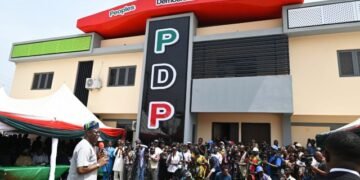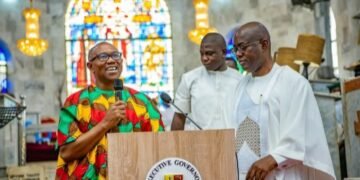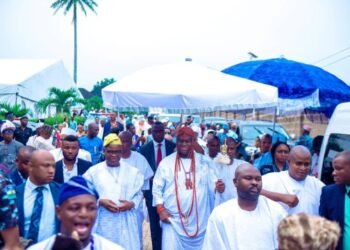Nigerians, once again, have been urged to embrace the hardship that was recently unleashed on them. There is probably more to come. After all, God never bestows a burden that is too heavy to carry.
In his third speech to Nigerians since mounting the saddle of leadership, President Bola Ahmed Tinubu reiterated his administration’s economic policy posture which, in the short term, may generate more hardship on Nigerians.
Fuel subsidy heralded these policies, all supposedly aimed at repositioning the economy and making life better for Nigerians.
Thus, citizens are expected to adjust for needed sacrifices for the president’s lofty dreams to come to fruition. Nigerians should rest.
He assured in his Democracy Day speech that savings from fuel subsidy removal, which had hitherto enriched few, will be judiciously used for citizens’ benefit.
The government would repay their sacrifice with massive investment in power, healthcare and infrastructure, among others. Assurance of regular power supply alone is enough to titillate Nigerians. of a few unpatriotic elements.
The speeches, advertently or otherwise, omitted clear-cut statements on the sacrifices entailed and who is to make the most sacrifice.
The president’s lack of clarity or non-committal may suggest that ordinary Nigerians are the ones to bear the brunt of rebuilding the nation, while the political class maintains the status quo of exotic lifestyles and self-aggrandizement.
Nigerian politicians, according to reports, are one of the most remunerated globally. Its legislators rank as one of the most highly paid, with approximately N13.5million monthly take-home, beside other perks. Shehu Sani, former Nigerian Senator, confirmed this in 2018.
Nigeria’s meagre budget, sustained largely by loans, services an overloaded bureaucracy including at least 36 ministers, fleet of cars and aides for dignitaries, several presidential jets, and uncommonly long convoys during official and unofficial functions. Several billions of naira on annual security votes for state governors are largely unaccounted for.
In the midst of this horrendous waste, Nigeria was reduced -under the immediate past government -to the poverty capital of the world. The National Bureau of Statistics data shows that 133 million Nigerians are multi-dimensionally poor.
According to a recent World Bank report, additional four (4) million Nigerians may join this ‘prestigious club’ of the poor if the government fails to ameliorate the socio-economic fall-out of its subsidy policy.
In similar vein, 33.3 per cent Nigerians are unemployed while 22.8 per cent are underemployed. Small-scale businesses and similar initiatives are strangulated by poor power supply and lack of other critical infrastructure.
What burdens, then, has God given to Nigerians to bear which they must gleefully embrace?
It is the burden of enduring the nearly 300 per cent hike in petrol price at a swoop, projected to reach 365 per cent by July 2023. It is the burden of the proposed 40 per cent or more increase in electricity tariff, also to take effect sometime in July, if implemented.
It is the burden of students’ loans that must repaid maximum two years after completing Youth Service, failing which prison sentence beckons. The burden of bearing with the 30 per cent performance index of public service. And it is the burden of approximately 300 per cent inflation of goods and services across the country.
These should result in further reduction in living standard, deepening impoverishment and prospect of more suicide, sometimes disguised, as natural deaths.
There is also the potential loss of jobs due to businesses’ inability to sustain operational costs, as well as increased school drop-outs. The list is endless.
Meanwhile, the Revenue Mobilization, Allocation and Fiscal Commission (RMAFC), is said to have proposed increase in the wages of political office holders by 114 per cent. Civil servants are expected to gladly accept a possible meager 50 per cent salary increase and 5,000 to 10,000 naira monthly palliatives, for ordinary Nigerians. This may even, characteristically, get diverted.
President Tinubu’s remark, therefore, is an indication of lack of appreciation of the suffering and endurance threshold of Nigerians. It smacks of insensitivity to expect Nigerians to suffer more without any compelling indicator of sacrificial leadership.
That politicians would continue to earn jumbo pay and allowances, in addition to other hidden ‘perks of office’, while citizens endure more poverty and misery is perplexing.
Prior to President Tinubu’s Sallah Day admonition, the Speaker of the House of Representatives, Tajudeen Abass, appointed a near-full cabinet of 33 ‘personal aides’ “to assist him discharge his onerous responsibilities”. This is beside the numerous existing legislative aides and civil servants that cater to the National Assembly.
It is an indictment of the self-centered leadership that Nigeria has produced over time. It is also a lack of appreciation of what genuine democratically governance should be.
John Locke, the famous philosopher, emphasizes governments’ obligation to secure and protect the God-given inalienable natural rights of the people including socio-economic rights.
Nigerian leaders whimsically regale the population with tales of the comparatively high cost of living abroad. They mischievously obscure the simple and sacrificial lifestyles of those leaders. Few examples of political leaders who prioritized their peoples’ well-being above self-interest suffices for mention.
Lateef Jakande, former governor of Lagos State, was an emblem of visionary and selfless leadership. He achieved what his predecessor warned will be impossible.
Jose Mujica, former President of Uruguay, a third world and struggling country that is far less endowed than Nigeria, gave up his entitled palace for a personal lowly residence. He maintained an austere lifestyle.
Angel Merkel, immediate past German Chancellor, served her country selflessly and meritoriously. She catapulted her country’s economy to unprecedented height. The phenomenal achievement of this modest woman speaks loud about her character and vision.
Lee Kuan Yew turned Singapore, a third world country, to a first world and a global attraction. Singapore boasted of higher per capita GDP than the United States. That feat resulted from a selfless, classless, disciplined and visionary leadership. So there are examples of selfless leaders both in developed and developing countries.
The dilemma is why do Nigerian leaders, like the biblical Pharisees, hypocritically put the burden of ‘re-building the nation’ on the hapless populace while they refuse to lift a finger? Why do they wax in opulence and live like emperors of a conquered territory? Why do they lack genuine love for their people, unlike in saner climes?
Nigerian leaders are hardly short of good policies or examples to follow. The problem is that they usually lack the wherewithal to execute or rejig the system for successful realization of their noble ideas.
President Goodluck Jonathan, at the beginning of his tenure, canvassed the Singaporean leadership model. Yet, he failed to follow through for whatever reason(s). Nigerians are ever expected to bear the brunt of policy failures and sacrifice for their lords called ‘leaders’ to maintain their exotic lifestyles.
Government’s insensitivity played out in its swiftness in introducing these life-choking policies and its slowness in laying out impactful palliatives.
A more sensitive and emphatic government should have accompanied the announcement of removal of subsidy with a strong promise to cut down the cost of governance, reduce wastes and commit to overarching and decisive fight against corruption.
In order to assuage the fears of Nigerians, good conscience and equity beckon on our leaders to avail the populace of their own quota of the sacrifice for the actualization of the Nigerian rebuilding project.
The president also needs to come to terms with the repeatedly bemoaned Nigerian corruption albatross, which remains a threat to every progressive policy.
Failure to combat this monster decisively and honestly would unarguably frustrate government’s efforts at lifting Nigeria out of the current doldrums.
If the president and the Parliament cannot help the anti-corruption agencies to succeed, they should by no means stand in their way.
•Ogundipe, a public affairs analyst, writes from Abuja.




























